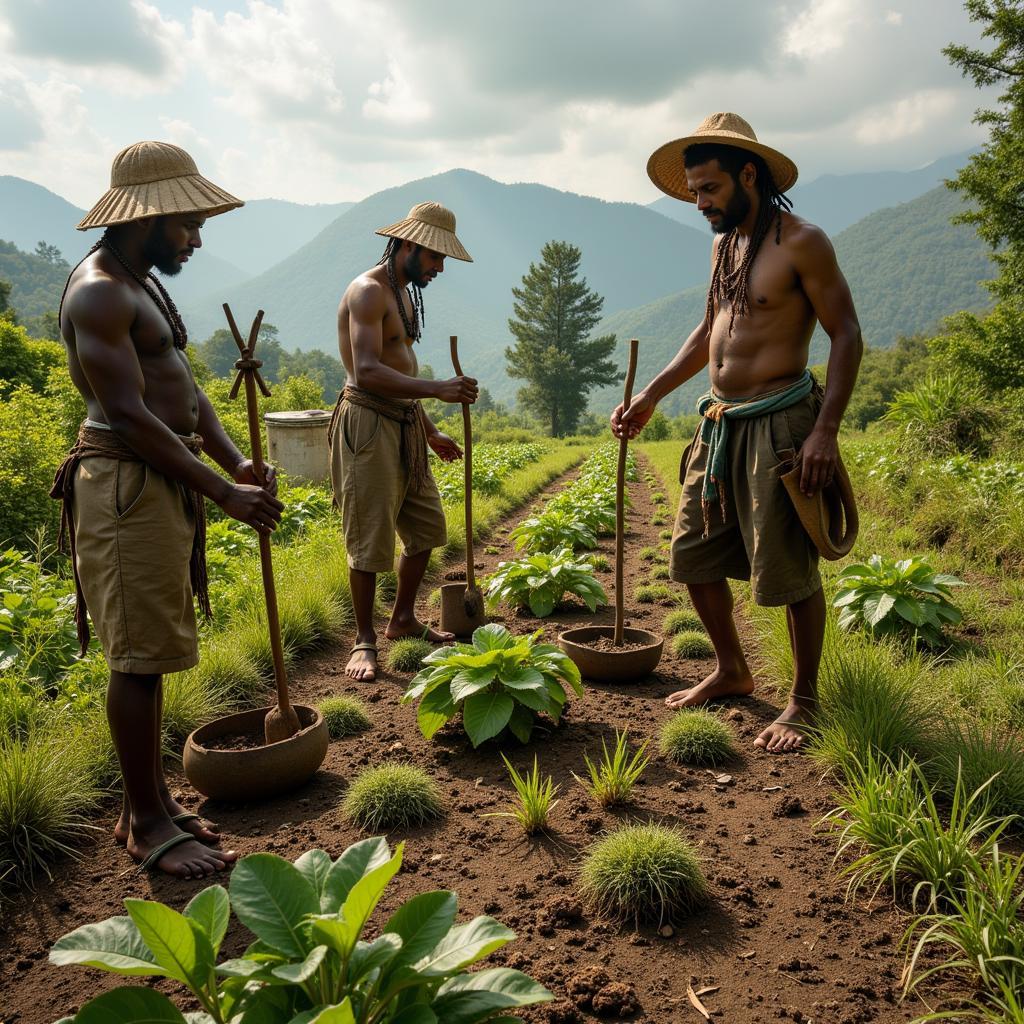Primitive Society, a term often used to describe early human social structures, evokes images of simplicity and a struggle for survival. But what did life in these societies truly entail? This exploration delves into the complexities of primitive social organization, challenging common misconceptions and revealing the rich tapestry of human experience in these foundational communities.
Defining “Primitive” Society: Navigating the Terminology
The term “primitive society” itself is fraught with issues. While commonly used, it carries a connotation of inferiority and lacks the nuance necessary to capture the diversity of early human experiences. Anthropologists now favor terms like “pre-industrial societies,” “forager societies,” or “small-scale societies” to describe these groups. These terms offer a more neutral and accurate representation, recognizing that these societies were complex and adapted to their environments, not simply stepping stones on the path to “civilization.” Many scholars also highlight the importance of understanding the affluent society definition in this context, challenging the assumption that early societies were inherently impoverished.
What Characterized a Primitive Society?
While varied, several common characteristics can be observed in pre-industrial societies. These include:
- Subsistence economies: Primarily hunter-gatherer or early agricultural practices.
- Small-scale communities: Limited population density and relatively small social groups.
- Kinship-based organization: Social structure based on familial relations.
- Limited technological development: Simple tools and technologies adapted to their environment.
- Oral traditions: Knowledge and history passed down through storytelling and ritual.
It’s important to remember that these are broad generalizations, and the specific characteristics of a primitive society varied greatly depending on location, environment, and cultural practices. Examining the huntsman society offers a glimpse into a specific type of social organization centered around hunting, illustrating this diversity.
Challenging Misconceptions about Primitive Society
One pervasive misconception is the idea that primitive societies were constantly engaged in a brutal struggle for survival, living lives that were “nasty, brutish, and short.” This Hobbesian view ignores the evidence suggesting that many hunter-gatherer societies enjoyed a relatively high degree of leisure time and social harmony. Marshall Sahlins, in his influential work, “The Original Affluent Society,” argued that these societies achieved affluence not by producing a lot, but by desiring little. Learning more about the marshall sahlins original affluent society can challenge our assumptions about progress and prosperity.
Were Primitive Societies Violent?
Another common misconception is the inherent violence of primitive society. While conflict undoubtedly existed, evidence suggests that widespread warfare was not a universal feature. Many societies developed sophisticated mechanisms for conflict resolution and maintained peaceful relationships with neighboring groups.
Dr. Anya Sharma, a renowned anthropologist specializing in pre-industrial societies, notes, “The portrayal of primitive society as inherently violent is a gross oversimplification. These societies, like all human societies, exhibited a range of behaviors, from cooperation and altruism to conflict and aggression.”
Learning from Primitive Society
Studying primitive society can offer valuable insights into human nature and the complexities of social organization. By understanding the challenges and successes of these early communities, we can gain a deeper appreciation for the diversity of human experience and the long history of human adaptation.
What can primitive societies teach us about modern society?
Perhaps surprisingly, primitive societies offer valuable lessons for modern society. Their sustainable practices, emphasis on community, and sophisticated social structures provide alternative models for organizing human life. Examining the savage society – a term now considered outdated and problematic – can help us deconstruct colonial narratives and understand the complex realities of pre-industrial cultures.  Sustainable practices in a primitive agricultural setting.
Sustainable practices in a primitive agricultural setting.
Exploring primitive society simulator can also provide interactive learning experiences and deepen our understanding of these complex social dynamics.
Conclusion: Rethinking Primitive Society
Primitive society, despite the limitations of the term, represents a crucial period in human history. By moving beyond simplistic narratives and embracing a nuanced understanding of these complex societies, we can gain valuable insights into our shared human past and the foundations of human social organization. Understanding primitive society helps us to appreciate the diversity of human experience and to challenge our assumptions about progress and civilization.
FAQs about Primitive Society
- What is the difference between a primitive society and a civilized society? The distinction is often based on technological development and social complexity, but these are subjective criteria.
- Did primitive societies have religion? Yes, most primitive societies had complex spiritual beliefs and rituals.
- How did primitive societies govern themselves? Governance varied widely, from informal leadership structures to more formalized systems based on kinship or age.
- What was the role of women in primitive societies? Women played vital roles in subsistence, social organization, and cultural transmission.
- How did primitive societies adapt to their environment? Through a combination of technological innovation, social adaptation, and cultural practices.
- Are there any primitive societies left today? While few societies exist in complete isolation from the modern world, some communities maintain traditional ways of life that offer insights into pre-industrial societies.
- Where can I learn more about primitive societies? Anthropological research, ethnographic studies, and archaeological findings provide valuable resources for learning about primitive societies.
Further Exploration
Consider exploring these related topics on our website:
- Hunter-gatherer societies
- The origins of agriculture
- Ancient civilizations
For support, please contact us: Phone: 02043854663, Email: [email protected], or visit us at Khu 34, Bắc Giang, 260000, Vietnam. We have a 24/7 customer support team.